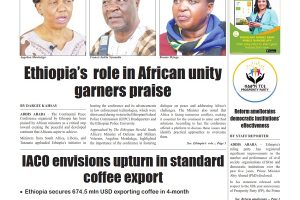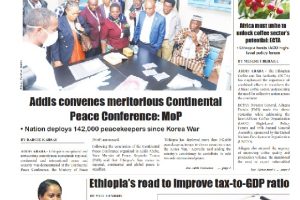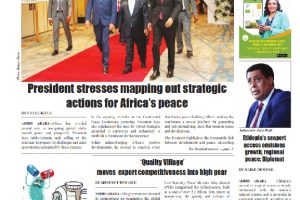
PART TWO
BY ALMARIAM
What losing peace means to those whose lips drip with the word “peace”
Nothing is more important to Ethiopians than peace. After all, the words “peace” rolls off the tongue of every Ethiopian – all 115 million of them – every day, dozens of times.
All Ethiopians greet each other by asking, “Selam neh/nesh”? “Are you at peace?” They bid each other farewell by saying, “Selam hun” (“Be at peace.”); “Beselam enegenagne” (“Let’s meet in peace next time.”)
They invoke peace for Ethiopia and themselves. Selam Le Ethiopia! (Peace be upon Ethiopia.) Selam lehulachinm! (Peace to all of us.) They express their wish for their country by saying, “Selamun yistegn (May the Almighty grant us peace.)
Ethiopians have a long-lived reputation of being a peaceful “unwarlike people”.
When America declared independence in 1776, and eleven years before the United States was created with the ratification of the Constitution in 1787, Edward Gibbon, author of the epochal six-volume “The History of the Decline and Fall of the Roman Empire” wrote of the need to defend the Ethiopians, then called “Abyssinians, an unwarlike people from the Barbarians who ravaged the inland country and the Turks and Arabs who advanced from the sea-coast in more formidable array.”
Gibbon wrote the Abyssinians were peaceful people interested in a rational project of importing the arts and ingenuity of Europe; and their ambassadors at Rome and Lisbon were instructed to solicit a colony of smiths, carpenters, tillers, masons, printers, surgeons, and physicians, for the use of their country.
Gibbon further observed: Encompassed on all sides by the enemies of their religion, the Aethiopians slept near a thousand years, forgetful of the world, by whom they were forgotten. They were awakened by the Portuguese, who, turning the southern promontory of Africa, appeared in India and the Red Sea, as if they had descended through the air from a distant planet.
So, why has peace been so elusive, so fleeting to Ethiopians? Could it be because Ethiopia is encompassed by enemies of her unity, sovereignty, territorial integrity and dignity?
Peace and the diaspora armchair/social media warriors
Many in the Ethiopian diaspora, particularly among TPLF supporters and other extremist groups, stand on the sidelines cheering for the war to continue.
For the past two years, these diasporans and Western lackeys (rent-a-intellectuals, press-titute media, think tankers, certain members of Congress and Biden officials) have waged epic media campaigns to demonize Ethiopia and proselytize the TPLF cause proclaiming Apocalypse, Armageddon and Genocide in Ethiopia.
It is so easy to wage war using the chatter of the computer keyboard as an AK-47 and YouTube as a weapon of mass distraction.
I came to understand the futility and absurdity of war after I started participating in the antiwar movement in the US in 1971, my second year of college. It was also in the same year that my college classmate, a brilliant and fearless conscientious objector, was charged with draft evasion for refusing to fight in Vietnam.
He was tried in US Federal Court in Augusta, Georgia and acquitted due to his belief in nonviolence. He was represented by the only black lawyer in town (to my knowledge). (Watching that trial convinced me that I should also become a lawyer and fight for the underdog.)
Several of my college classmates were wounded veterans in the Vietnam War. One of my closest friends was a helicopter pilot who was shot down and became disabled. The other served in a field artillery battalion. Others in my circle were “jarheads” and “grunts.” We were all in the antiwar movement, none of us over 22 years of age.
In 1971, the trials for the My Lai massacre of 1968 took place. “More than 500 people were slaughtered, including young girls and women who were raped and mutilated before being killed.” Lt. William Calley was convicted and sentenced to life imprisonment for his role in the My Lai Massacre. Calley served three years of house arrest for 22 cold-blooded murders he committed during the My Lai massacre!
Today, Ethiopia is lectured and hectored to prosecute war criminals and alleged genociders. The hubris and hypocrisy of power!
While on the subject of war and genocide, I learned about the “Trail of Tears” and the forced brutal removal of tens of thousands of Cherokee, Creek, Chickasaw, Choctaw, and Seminole peoples from Southeastern United States. Some of their descendants were my pupils.
I have never been to war but I have heard horrifying stories from my classmates who lived the hell of war and barely lived to tell about it. Touché!
My journey into Ethiopian human rights advocacy began with a 2006 two-part essay on civil disobedience and nonviolence.
I hate war, the lords of war and warmongers. Is war ever necessary? Is there a “just war” as Augustine and Aquinas argued? War that is rooted in morality (holy war)? I think not.
I share the words of Robert Graves, who wrote verse as he fought behind the lines in WW I,
To you who’d read my songs of WarAnd only hear of blood and fame,I’ll say (you’ve heard it said before)‘War’s Hell!’
Sartre wrote, “Hell is—other people!” in his play, “No Exit.” I wonder if there is ever an exit out of the hell of war. I am always for peace.
In my July 22, 2012 commentary, “My Dreams of Ethiopia at Peace”, I made my case for peace with eerie prophetic vision:
Truth be told, we should be concerned about a nation that has been in intensive care and on life support for the past 21 years and beyond. We should pray for the healing, speedy recovery and well-being of Ethiopia. We should be searching high and low in our hearts, minds and souls for the best medication to heal Ethiopia from the cancer of tyranny and dictatorship and the pathology of hate and narrow-mindedness. We should work tirelessly to detoxify the Ethiopian body politic from the poison of ethnic domination, sectarianism and bigotry.
To restore Ethiopia to good health, we must begin national dialogue, not only in the halls of power, the corridors of the bureaucracy and the military barracks but also in the remotest villages, the church and masjid meeting halls and other places of worship, the schools and colleges, the neighborhood associations and in the taverns, the streets and markets and wherever two or more people congregate. We have no choice but to begin talking to each other with goodwill and in good faith.
“Man is wolf to man.” (Homo homini lupus): Learning from a Cherokee fable of the good and bad wolf
Humans regard the wolf as a predatory, rapacious, marauding, vicious, merciless and ravening. The Cherokee Nation of Oklahoma is one of the largest Native American nations in the United States. The Cherokee people, along with many other indigenous nations, who have been subjected to unspeakable suffering and whose woeful history is partially remembered in the ‘Trail of Tears’ have wonderful folktales and traditional stories.
One of my favorites is the folktale of a grandfather teaching his grandson about good and evil. I used this instructive folktale in my April 2013 commentary. ‘A fight is going on inside me’, the grandfather told his grandson. ‘It is a terrible fight and it is between two wolves.
One is an evil wolf who is full of anger, envy, sorrow, regret, greed, arrogance, self-pity, guilt, resentment, inferiority, lies, false pride, superiority, and ego. The other is a good wolf. He loves joy, peace, love, hope, serenity, humility, kindness, benevolence, empathy, generosity, truth, compassion, and faith.’
The grandfather added, ‘The same fight is going on inside you and every other person, too.’ The grandson thought about what his grandfather said and asked, ‘Which wolf will win?’ The grandfather replied, ‘The one you feed.’
There are good and bad wolves trekking the Ethiopian highlands, lowlands and diaspora-lands. They desire no peace. They want a continuation of war so they can profit from it churning the YouTube money machine and monetizing social media.
There are many others who wish to see the war continue so that they can continue to ply their trade of corruption and graft in Ethiopia. Peace written on a piece of paper will not quell the vampiric lust for blood of the bad wolves. It is up to the good wolves to ensure lasting and durable peace. Peace flourishes where there is trust, faith, hope, love and charity.
The African Union’s Monitoring, Verification and Compliance Mission (AU-MVCM)
The principle, “African solutions to African problems,” means Africans (and only Africans, if you don’t mind) negotiate, mediate, monitor, verify and ensure compliance with peace solutions.
There are some who argue that the African Union is not strong enough nor does it have the resources to do a good job with monitoring, verification and compliance of the Ethiopian peace agreement. I disagree very strongly!
The permanent ceasefire agreement is the African Union’s moment to rise and shine. Failure is not an option! The AU team consists of highly experienced African military and civilians leaders who are already in Tigray ready to do their duties.
I do not believe the AU team will have a difficult time performing its duties as the Ethiopian government is discharging its obligations under the agreement without a hitch. There is unimpeded humanitarian access. Essential service including power, banking and internet connectivity are available in most parts of Tigray.
The Ethiopian federal police have entered Mekele and other parts of Tigray, and civilians no longer face widespread organized violence.
Hiccups are to be expected in any complex monitoring, verification and compliance process. Whatever challenges come to the AU team, its experienced military and civilian members can deal with it. By themselves, ALONE!
My gut feeling is that foreign forces will secretly work to sabotage and undermine implementation of the peace agreement. But that goes without saying. As long as Africans stick firm to their credo, “African solutions to African problems,” they can never be defeated! Anyone else is IRRELEVANT!
“War is the epitome of hell… I know because I have been there and back. ”
As PM Abiy Ahmed’s supporters and detractors speak of his efforts to resolve the Tigray conflict, they should pause and reflect on the reasons for which he was awarded the Nobel Peace Prize and his unique methodology for peace.
Why did PM Abiy choose peace over war in Ethiopia’s relations with Eritrea? Why did he choose a humble peace over a magnificent military victory in the TPLF war in Ethiopia? Why did he choose dialogue and negotiations when he could have achieved crushing and glorious military victory over the TPLF? Why did he choose not to inflict total humiliation on the criminal TPLF and consign them to the trash heap of history?
There are many who criticize PM Abiy for choosing peace, dialogue and negotiations over decisive and crushing victory over the TPLF. There are many who would prefer he had chosen the road well-travelled and insisted, “An eye for an eye.”
I wonder if they have seriously pondered the obvious that “an eye for an eye makes a whole nation blind.”
Nelson Mandela said, “If there are dreams about a beautiful South Africa, there are also roads that lead to their goal. Two of these roads could be named Goodness and Forgiveness.”
Could it be that if there are dreams about a beautiful Ethiopia, there are also roads that lead to their goal? Two of these roads could also be named Goodness and Forgiveness.
Editor’s Note: The views entertained in this article do not necessarily reflect the stance of The Ethiopian Herald
THE ETHIOPIAN HERALD THURSDAY 5 JANUARY 2023





